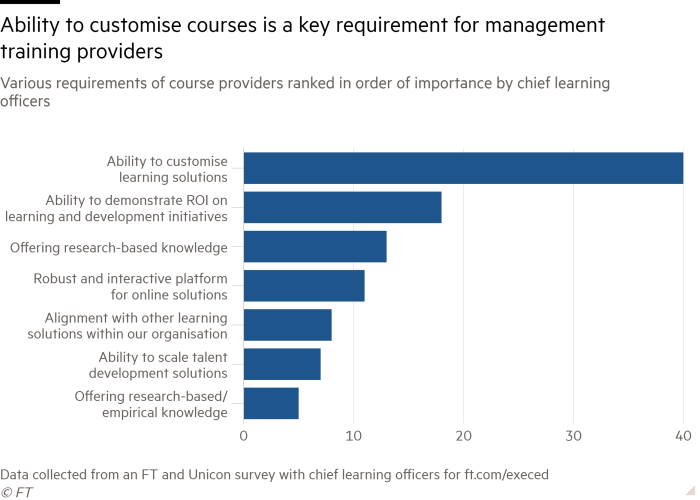Business School Briefing: The after-life of acquired companies

Roula Khalaf, Editor of the FT, selects her favourite stories in this weekly newsletter.
Welcome to Business School Briefing. We offer you insights from Andrew Hill and Jonathan Moules, and the pick of top stories being read in business schools. Edited by Wai Kwen Chan and Andrew Jack.
Andrew Hill’s Management Challenge
Listed companies typically have only a 50-50 chance of making it through the next 10 years without going bust or being taken over, according to a new study of UK quoted companies I’ve written about this week. From a cohort of 1,513 in 1948, only 19 were still independent in 2018.
So much for the half-life of companies, what about their after-life, once acquired and assimilated? The dearth of post-takeover information makes it hard to tell how they fare. For my management challenge, tell me what you would ask acquirers to reveal five years after a takeover to show how well the company they had bought was performing. Send your brief thoughts to bschool@ft.com.
Last week I asked what Nestlé should do with its “unhealthy” products. Toby JW Head suggested: “Make them out of the best ingredients you can source, charge a premium . . . and market [them] as an indulgence to be enjoyed on rare special occasions because you have earned it.” That said, I also liked @DavidLGReilly’s response on Twitter: “KitKat is a monumental chocolate experience, I would tell you to lighten up, we need more joy.”
In further watching this week, you can register for a free viewing of the wide-ranging FT Live Digital Dialogue I chaired recently, featuring, among others, Mitchell Baker, chair of Mozilla, and author Margaret Heffernan. They had plenty of insights into the “post-pandemic world” and touched on the future of technology and the themes they’d like business books to tackle. If you’re an author, or potential author, planning to enter this year’s FT/McKinsey Business Book of the Year Award or Bracken Bower Prize, it’s a must-watch.
Jonathan Moules’ business school news
After a year of online teaching comes the virtual graduation ceremony season, and business schools are again trying to harness the advantages of technology to find opportunities that would be impossible for in-person events. Skema Business School streamed its ceremony to more than 5,000 graduates, across three shows on five continents, making it far easier for students, and their friends and family, to feel part of the occasion. The Hollywood-style show – including a virtual futuristic city, called Skemapolis, created just for this event — was also delivered in French and English.

MBA students with an interest in the fine art market will be able to gain specialist insights to develop their career through a programme at Geneva Business School. Specialist MBA programmes have been a trend in recent years, supporting students who do not want to follow conventional MBA career paths, such as investment banking and consultancy. Art schools have also partnered with business schools to create MBA programmes. However, the Fine Art International Management MBA claims to be the first to specialise in the skills needed for collectors, dealers and artists.
For further reading this week, I am recommending this piece from the Harvard Business Review on the need for leading with humanity. It was written at the start of the pandemic last year, but remains relevant today.
Data line
Chief learning officers were asked to rank various requirements they seek from course providers that deliver management and executive programmes. The ability to customise training was ranked first, followed by a demonstration of return on investment (ROI) from courses, say Leo Cremonezi and Andrew Jack. Offering research-based teaching is the least sought-after requirement.

Further results from the CLO survey can be found here.
FT business books of the month
Find out how hubris can destroy effective leadership and the new world of work in this month’s top titles.
Business leaders are facing an obstacle because of the pandemic: managing employees remotely.
Mike Parkes shares, in his book Leading Remotely, empirical research to show how leaders have successfully navigated the challenges of remote leadership and aims to answer the fundamental question, how do you stay close to the business while operating from afar?
How the class of 2021 is making up for lost internships
According to Prospects, a specialist graduate careers organisation, just 17 per cent of undergraduate students in the UK have had work experience in the past 12 months.
Students have missed real-world experience that builds skills but universities are helping to close the gaps.
Top business school reads
UK presses for City of London carve-out from G7 global tax plan Britain said to be among countries pushing ‘for an exemption on financial services’
Defiant Johnson ‘will not hesitate’ to suspend Northern Ireland protocol UK prime minister says EU leaders are acting in a draconian way over trade checks on goods
US consumer prices climb at the fastest pace since 2008 Hotter than expected reading comes amid concerns about inflationary pressures as economy reopens
How good is your knowledge of the news?

Back issues
To view previous newsletters, go to: ft.com/bschool.
If you are an FT subscriber and this email has been forwarded to you, you can sign up for the FT Business School Briefing.
Comments